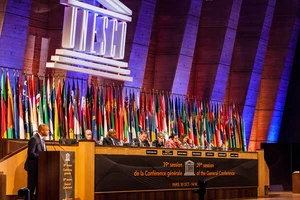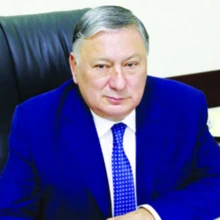UNESCO General Conference to be held in Samarkand, Uzbekistan[Over]  The 43rd UNESCO General Conference is scheduled to take place in Samarkand in 2025. The 43rd UNESCO General Conference is scheduled to take place in Samarkand in 2025.
This marks the first time Uzbekistan will host the biennial event. Historically, these conferences have primarily been hosted at UNESCO's headquarters in Paris since 1986. However, there have been eight exceptions, with meetings held in cities like Mexico City (1947), Beirut (1948), Florence (1950), Montevideo (1954), New Delhi (1956), Nairobi (1976), Belgrade (1980), and Sofia (1985).
READ MORE
- Saturday, 17 August 2024, 08:42
Uzbekistan’s bold steps towards WTO membership[Over]  Qodir Djuraev, Qodir Djuraev,
Vice Chairman, Committee for International Affairs and Inter-parliamentary Relations, Legislative Chamber of Oliy Majlis of the Republic of Uzbekistan
The World Trade Organization (WTO) is the world’s largest and most influential trade and economic organization, renowned for its capacity to provide a comprehensive legal system for international trade. Critical documents enacted by the organization place responsibility on member states to conduct trade policy according to commonly agreed criteria. The aim is to help producers, exporters, and importers of goods and services operate successfully in the global market. READ MORE
- Friday, 9 August 2024, 08:34
Uzbekistan: civil society institutions — a bridge between society and state[Over]  Anvarjon Mirkomilov, Head of Department Anvarjon Mirkomilov, Head of Department
Development Strategy Center
Today, civil society institutions, particularly non-governmental non-profit organizations (NGOs), play an active role in Uzbekistan's development and the implementation of the “Uzbekistan – 2030” strategy. It is impossible to build a new Uzbekistan without organizing the activities of NGOs, the most important institution of civil society, according to democratic principles. On this basis, effective work is being done to support NGOs and civil society institutions, strengthen social partnerships with state bodies, implement effective public oversight, and improve the legal framework governing this area.
READ MORE
- Saturday, 29 June 2024, 18:01
Shavkat Mirziyoyev: “I devote my life to the Uzbek Nation”[Over]  Qudratilla Rafikov,
Political scientist Qudratilla Rafikov,
Political scientist
In the speech of our President at a recent meeting with activists of Jizzakh region, one point caught the attention of most of the people. In it, the head of state said the following:
"If God gives me health and life, the days will come when we will not have poverty and unemployment. I have devoted seven years of my life to this, created a system for this, created laws, opened the world. I came to this position, so that my people would live well, so that their dreams would come true, so that their children would live in prosperity and be happy, so that their grandchildren would be born healthy, so that medicine would work, schools would work, roads would be smooth...".
READ MORE
- Saturday, 15 June 2024, 09:55
Environmental Challenges: The Future of Human Rights and Sustainable Solutions in a Changing World[Over]  This is the name of the next topic of the IV Samarkand Forum on Human Rights, a traditional international conference to be held in our country on June 13-14, 2024. It is planned to hold three plenary meetings offline and online within the framework of the forum. This is the name of the next topic of the IV Samarkand Forum on Human Rights, a traditional international conference to be held in our country on June 13-14, 2024. It is planned to hold three plenary meetings offline and online within the framework of the forum.
The main goal of this year's Samarkand forum is to discuss issues related to the impact of climate change on human rights on a broad scale and on the basis of information analysis. In addition to gaining the necessary knowledge in this field, the participants of the international conference will have the opportunity to exchange experience and get acquainted with the best practices within the international community.
READ MORE
- Wednesday, 12 June 2024, 23:09
Gender Issues in Contemporary Uzbekistan[Over]  Roxila Mardonkulovna Usmanova, Doctoral Student, Institute of Family and Gender Research, Republic of Uzbekistan Roxila Mardonkulovna Usmanova, Doctoral Student, Institute of Family and Gender Research, Republic of Uzbekistan
Special attention is being paid to further enhancing the status of women in the new Uzbek society and ensuring their rights as a priority value. Gender equality is recognized as a social phenomenon that permeates all aspects of the life and activities of society, encompassing politics, economics, law, ideology, culture, education, and science, shaping the dynamics between women and men. In the words of the President of the Republic of Uzbekistan, Shavkat Mirziyoev, "The stereotype formed in the minds of our people makes me think about many things. Traditionally, we perceive a woman first and foremost as a mother, a keeper of the family hearth. This is undoubtedly true. However, today not every woman should not be just an observer, she should be an active and proactive participant in the democratic changes taking place in the country." Therefore, it can be asserted without exaggeration that in recent years, increasing the political, social, and economic engagement of women in Uzbek society has emerged as a top priority of state policy, driven by the political will of the Uzbekistani leadership.
READ MORE
- Wednesday, 5 June 2024, 22:52
Eco-Tourism in Uzbekistan: A Journey Towards Sustainability[Over]  In the heart of Central Asia, Uzbekistan, a country known for its dazzling architecture and rich history, is emerging as a promising eco-tourism destination. In the heart of Central Asia, Uzbekistan, a country known for its dazzling architecture and rich history, is emerging as a promising eco-tourism destination.
Eco-tourism in Uzbekistan presents an opportunity to explore the country’s natural beauty while contributing to its sustainable development. As more travelers seek out eco-friendly travel options, Uzbekistan stands as a testament to the power of eco-tourism to transform not just the landscape, but also the lives of the people who call it home.
READ MORE
- Thursday, 14 March 2024, 17:13
MIIT: In Uzbekistan, the implementation of 7,656 projects with a total value of $11.6 billion is planned in 2024[Over]  One of the key principles of Uzbekistan's economic growth is the widespread and parallel regional development, based on a deep analysis of the socio-economic situation of the country’s regions, including the study of resource base, production, transport-logistics potential, and demand for various high-value-added products. One of the key principles of Uzbekistan's economic growth is the widespread and parallel regional development, based on a deep analysis of the socio-economic situation of the country’s regions, including the study of resource base, production, transport-logistics potential, and demand for various high-value-added products.
According to the Ministry of Investment, Industry and Trade, based on the analysis results, regional investment programs (RIP) are formed annually and approved by the Government Commission, implemented with the coordination and support of the Ministry of Investment, Industry, and Trade of the Republic of Uzbekistan. Considering the identification of new opportunities, the list of projects expands throughout the year.
READ MORE
- Tuesday, 27 February 2024, 13:00
1
2
3
4
5
6
7
8
9
10
11
...
13
|
|